By Vanessa Quon
It was January 2016, and Helen Lenskyj sat in a coffee shop near Church and Wellesley with four fellow Queer Trans Community Defence members. Their heavy involvement in the group made them the unofficial core members, as Lenskyj liked to think. Situated around the table with their cups of coffee, they organized their approach for a soon-to-be meeting with two members of the 519—a community centre in the same neighbourhood—concerning the redevelopment project they were leading in Moss Park.
As 1 p.m. rolled around, they stepped into the second-floor board room located at the back of the 519 community centre. Modern furniture lined the room and the windows on the east side overlooked Barbara Hall Park, the host of the 519’s Pride events.
The defence held high hopes for an authentic and engaging conversation about redevelopment concerns. Maura Lawless and Becky McFarlane, the two representatives of the 519, sat at either end of the long, rectangular table. The symbolism was instantly transparent to Lenskyj: they were in control. Her and the other defence members had no choice but to spread out along each side of the table, claiming their role as guests.
“We know what we’re doing because we have a proven track record in the Church and Wellesley neighbourhood,” the 519 representatives stated, almost like they were reading a script. But Lenskyj wanted their specific concerns addressed. Following up, she inquired how they saw their plans playing out in Moss Park, considering it had a vastly different demographic than where the 519 was situated.
“Well, we’ll adapt accordingly, and we’ll evolve. We can’t say at this point what it will look like,” they said, maintaining the same script-like tone that Lenskyj described.
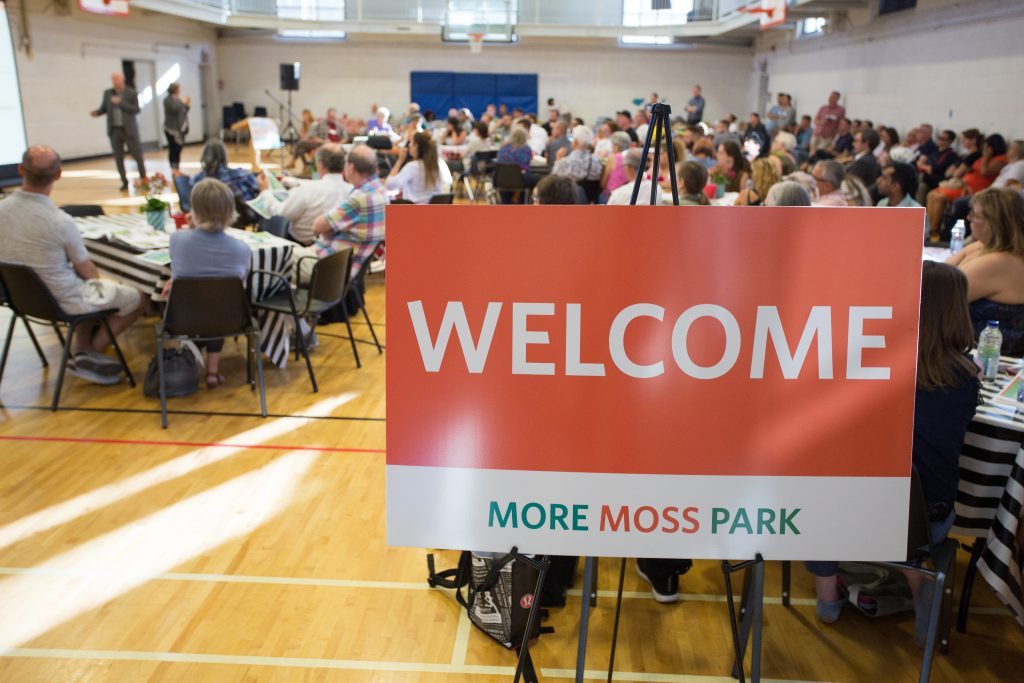
To Lenskyj’s ears, this translated to the 519 co-opting the idea of inclusiveness with no solid evidence as to how they would ensure it. The irony wasn’t lost on her either. The defence came to discuss the 519’s lack of engaged participation with Moss Park’s marginalized community in the decision-making process, and instead she felt a lack of engaged listening herself, receiving seemingly memorized, guarded and vague responses. The short one-hour meeting left her feeling uneasy with more questions than she walked in with.
The community redevelopment project was officially called More Moss Park by the City of Toronto and the 519. The initial plans were to redevelop the John Innes Community Recreation Centre, Moss Park Arena and surrounding park area at Queen and Sherbourne streets to build an LGBTQ-focused sports centre, claiming that the new programs and spaces would be accessible and inclusive to all community members.
After further community advocacy and discussions between the 519 and the defence in 2016, new plans emerged for the redevelopment. The 519 changed the nature of the project. They dropped the LGBTQ focus and instead focused on creating an overall “accessible and inclusive” space for those who call Moss Park home. The city stated that they have currently been revising the initial designs from the consultation process in 2016 and that there would be a public meeting in Spring 2019 for community members to provide further feedback to the revised design.
A closer look at John Innes Community Recreation Centre
Despite the 519 changing the focus of the redevelopment and saying they were going to hold further consultations with the community in 2019, the defence didn’t see any improvement with the way community voices and needs were being handled. They knew that if the project continued, the marginalized population of the Moss Park community would be in trouble.
Brian De Matos, a founding member of the defence and a former 519 employee, noticed that there was an abundance of straight, middle to upper class white people present at community meetings supporting the idea of gentrification. “Who’s not being listened to? Folks with addiction issues, folks who are homeless, trans folks, racialized folks, folks that are in the greatest need were not only not being listened to but also systemically displaced by this project,” De Matos voices.
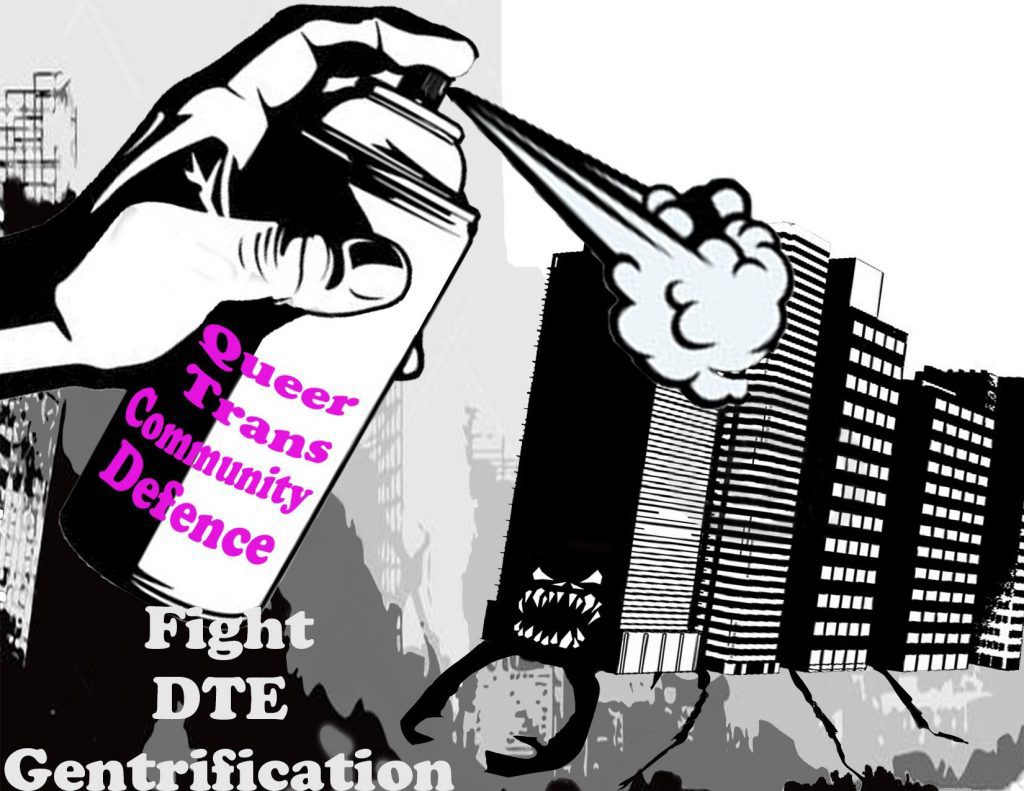
Formed in 2015, the Queer Trans Community Defence’s core concerns were to combat gentrification and poverty in the Downtown East, mainly focusing on this proposed inclusive redevelopment. Along with many other marginalized groups in the community, they believed the redevelopment would further gentrify the neighbourhood—similar to the rise of new condo buildings in the area—by displacing existing marginalized communities who used the space, especially through rising costs of living, increased police violence, cuts to public services and overall racism and discrimination. The defence first began their journey with community consultations, then to broader consultations with the city to being advocates of anti-gentrification in the Moss Park neighbourhood.
To De Matos, the 519 was using support for the LGBTQ community as a cover up for their gentrifying ways, waving a rainbow flag over the destruction of poor communities that included many LGBTQ people. Hence the defence’s slogan, “No Pride in Gentrification.” They believed that having an LGBTQ-focused gym would only benefit the privileged in their community—white, cisgender, gay middle to upper class men—while ignoring the most vulnerable, such as trans people and people in poverty. To put Moss Park into perspective, 35 per cent of its residents are below the poverty line compared to 22 per cent for Toronto overall.
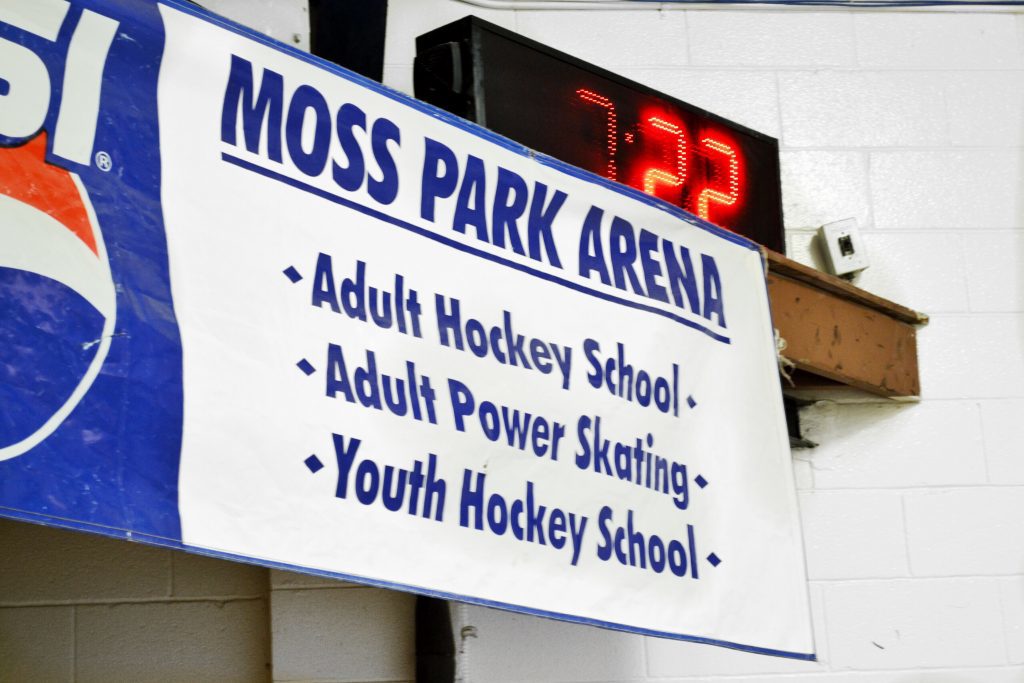
Located at Queen Street East and Sherbourne Street, Moss Park Arena hosts an array of adult and youth hockey and skating events. The Tuesday Night Women’s Shinny team met on Feb. 5, 2019 at 7 p.m. (Vanessa Quon/T·)
Displacement from homes and neighbourhoods are big possibilities for communities experiencing gentrification. Lenskyj explains that the theory of gentrification lends itself to the demonization of low-income and homeless people, people with addictions and people with mental illnesses and creates the myth that they’re undesirable and dangerous. “If you’re the new owner of a gentrified building you will not want them anywhere near you or your children. They’re drug addicts, they’re alcoholics, they’re mentally ill, they’re thieves, they’re vandals,” she added. “Their prejudices are not remotely hidden.”
Gina Dineen, a member of Moss Park Arena’s Tuesday Night Women’s Shinny Team, carries her large bag of hockey equipment on her shoulder, her yellow and black hockey stick in hand. She pushes through the door to the women’s change room, greeted by excited chatter and zippers as the team prepares to board the freshly cleaned rink for their game. Some of the members have been meeting almost every Tuesday night for the past few decades.
Dineen, one of the original members of the team, sits on the old wooden bench, pulls out equipment from her bag and puts it on step by step: skates, shin pads, socks, shoulder pads, her blue and white number 12 jersey and finally, her helmet.
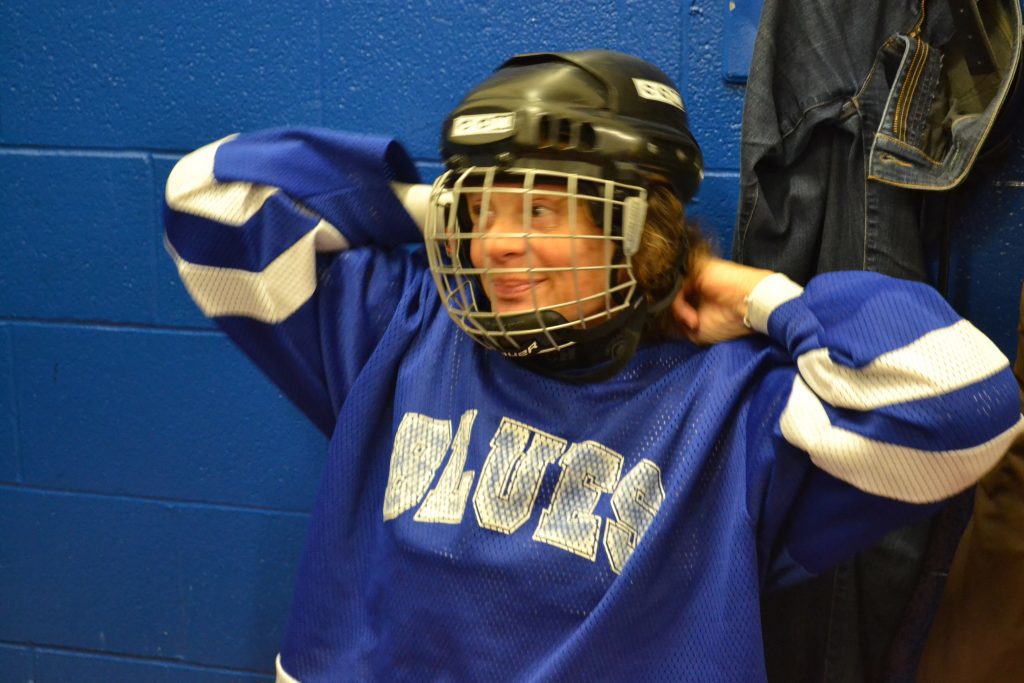
Gina Dineen puts her helmet on in the Moss Park Arena change room on Feb. 5, 2019. (Vanessa Quon/T·). 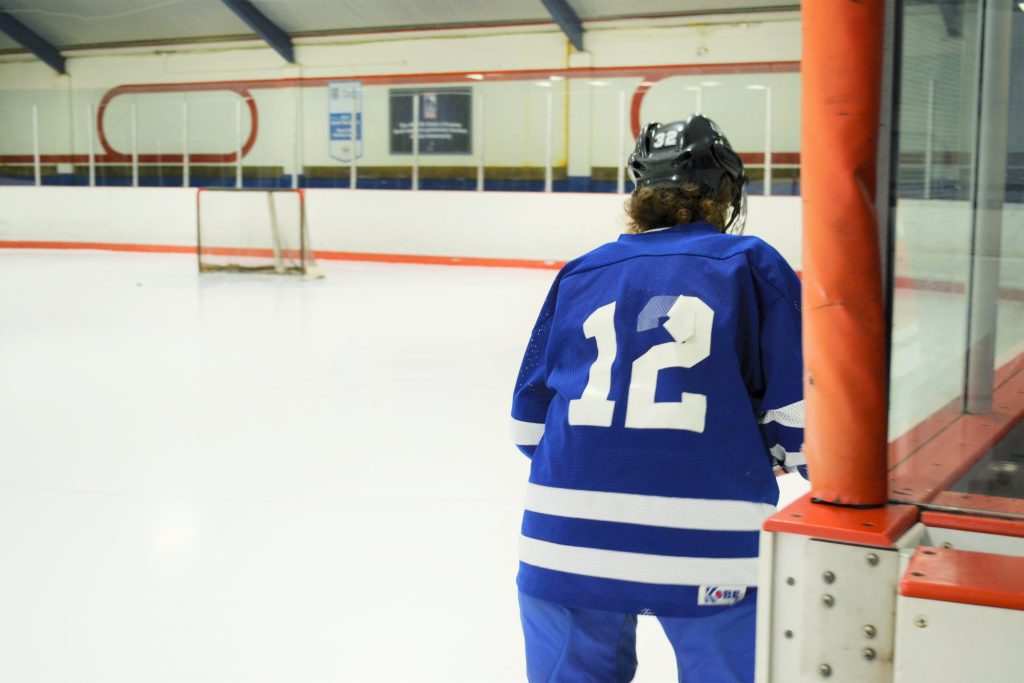
Gina Dineen warms up with laps around the rink at Moss Park Arena on Feb. 5, 2019. (Vanessa Quon/T·)
She voices her concerns over feeling like the team was not a part of the redevelopment’s equation, disapproving the original LGBTQ-focused sports centre. She felt the city was not listening to concerns of the team—that of which is primarily made up of women who are a part of the LGBTQ community—about being pushed out of their already limited time on the rink. Instead, she hopes that the 519 and the city consider the value of people like herself and her team members who found a sense of community within one of Moss Park’s already-existing recreation centres.
Gina Dineen, a member of Moss Park Arena’s Women’s Tuesday Night Shinny, shares her thoughts on the neighbourhood’s redevelopment plans. (RSJ/Vanessa Quon).
De Matos believes the large amount of funds given to the 519 for the redevelopment should instead go straight to the community, handing the power over to those who live there so they can decide for themselves how to use it. He would rather see the city consulted on the project rather than on the front lines. “They should let folks like us,” he says, “who live in that community be the leaders of that project.”
